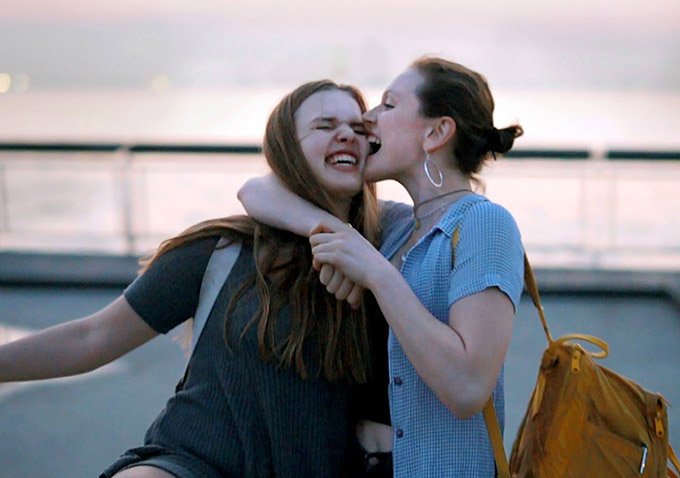 Near the end of the documentary “All This Panic,” one of the handful of teenage girls we watched struggle with the first painful steps into adulthood laments the childhood tendency to be impatient when it comes to growing up. As soon as we’re 11 years old, we pretend to be teenagers already. When we’re 15, we want to be 18 so we can be taken seriously as legal adults. When we’re 18, we want to be 21 so we can legally drink.
Near the end of the documentary “All This Panic,” one of the handful of teenage girls we watched struggle with the first painful steps into adulthood laments the childhood tendency to be impatient when it comes to growing up. As soon as we’re 11 years old, we pretend to be teenagers already. When we’re 15, we want to be 18 so we can be taken seriously as legal adults. When we’re 18, we want to be 21 so we can legally drink.
Yet once we’re 21 and begin moving forward into the drudgery and mayhem of adulthood, we miss being 11, 15, and 18. Just like every generation before them, the girls in “All This Panic” have the chance to truly enjoy their carefree years, free from adult responsibility, yet the future cannot come soon enough for them. If only a lot of us could have tangibly realized that our youths wouldn’t last forever and have taken advantage of it while it lasted, instead of regretting that lack of perspective once it’s too late.
Perhaps that’s why we envy the freshmen college athletes in Richard Linklater’s invigorating “Everybody Wants Some!!,” not because they necessarily have more time to take advantage of their youth, but because they are self-aware enough to realize that the party won’t last. The weekend before freshman classes begin is their chance to live out the last days of their carefree youth before adulthood rears its ugly head, so they do their best to ride the irresponsibility train until the wheels fall off.

When we meet the girls in “All This Panic,” they are all around 17, and they either can’t wait to become their adult selves, or are forced into becoming adults by parents or outside circumstances. The first moments of this raw yet heartwarming film show the girls letting loose and throwing parties, but they’re also painfully aware that the innocence of childhood is fading more and more every day.
Director Jenny Gage followed this group of girls living in Brooklyn over a three-year period as she documented their day-to-day lives. By the time we near the end of their story as they approach their dreaded 20s, one of the girls confesses that she doesn’t want to become as sexually active and cynical as her peers because she wants to hang onto the simplicity of her childhood as long as possible. It’s a naïve sentiment, to be sure, but it’s hard not to sympathize with her.
Gage adopts an intimate and objective approach to her doc, one that’s reminiscent of the Maysles Brothers’ work. She places her camera intimately close to her subjects and stands back as she lets them express the many confusions, joys, and frustrations of being a late teenager. There isn’t any voice-over or expository text; we only get a brief text of the girls’ names when they’re introduced.

Similar to “Boyhood,” the passage of time isn’t clearly marked; rather, we experience the days and months passing by simply through the girls’ appearance and demeanor, which lets us remember how quickly we change during these important years in our development.
Gage does a remarkable job making the girls forget the presence of the camera as she captures some surprisingly personal interactions, like a moment where the father of one of the girls confesses to her that he wants her to stick around after high school so they can be friends again, since they spent her teenage years fighting with each other. Gage shows a close-up of the girl quietly crying, perhaps realizing that she spent a chunk of her childhood being angry at sheer triviality.
The central figure of “All This Panic” is Lena, a sweet and introverted girl who’s thrown into the responsibilities of adulthood far too quickly. Because her brother and father suffer from serious mental-health issues, and her mother can’t provide for her anymore, she has to fend for herself a lot sooner than she thought she would. Yet she finds a way to enjoy her life in the middle of her stressful existence, perhaps even more than the other girls who aren’t in as much of a grave situation as she is. She’s the kind of person you see in documentaries that you want to reach through the screen, give her a big hug while letting her know that this, too, will pass.

“All This Panic” doesn’t offer any revolutionary approaches to this type of intimate documentary, and the subject matter might be too broad for some, but it makes up for its lack of originality with heart and genuine emotion. It makes us realize that, regardless of which generation we belong to, we all go through the same growing pains. [B+]
Browse through all our coverage of the 2016 Tribeca Film Festival by clicking here.

